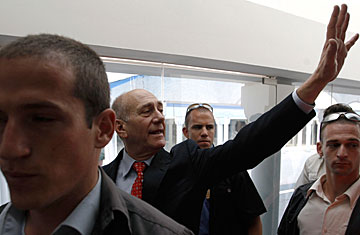
Ehud Olmert
Hounded by allegations of corruption, Israeli Prime Minister Ehud Olmert resigned on Sept. 21 after 33 months in office, but he will remain as head of an interim government until a new ruling coalition is formed by the country's quarrelsome parties.
The onerous task of forging a new coalition from among the 13 parties in the Knesset, Israel's parliament, will be taken on by Tzipi Livni, Olmert's Foreign Minister and his replacement as the newly elected head of the centrist Kadima party.
Olmert's departure, though long awaited, has plunged Israeli politics into turmoil. One Haaretz columnist joked that Livni would have an easier time recruiting enemy Syria to her side than trying to woo over rebellious Knesset members. His remarks come after a Damascus daily glowingly referred to her as a "Mossad beauty" because Livni, now 50, had served as a junior Israeli spy in Europe during the 1980s.
Even before Olmert handed in his terse, two-sentence resignation to President Shimon Peres Sunday night, Livni was trying to shore up support over the weekend for a new government. She already faces one handicap: she emerged as Kadima chairwoman after a bruising leadership battle that has left her party divided. Livni has 42 days to form a new coalition representing 61 of the 120 Knesset seats. If she fails, under Israeli law, President Peres will turn to another politician — most likely Benjamin Netanyahu of Likud, the conservative opposition party — to see if he fares any better. If not, Israel could face general elections within 90 days.
First, Livni will try to glue back together the coalition fabricated by Olmert with the Labor Party along with smaller parties representing pensioners and the ultra-orthodox lobby. She is trying to bring Labor on board again by offering them a "real partnership" — making key concessions that Olmert would not. She will have to contend with the ego of Labor leader Ehud Barak, a medaled ex-general and former Prime Minister who finds it difficult to take orders from Livni, a relative newcomer to Israeli politics. Experts say that Barak wants Livni to give Labor better cabinet posts and may want Olmert's 2009 budget rewritten. Livni has one advantage: polls show that in an early general election, Labor under Barak would take a beating, so he is likely to sign up with her.
Next, Livni will turn her brusque charm on Shas, the ultra-orthodox party that was the most problematic member of Olmert's coalition. Shas was the main obstacle to Olmert's attempts to make peace with the Palestinians, and its leaders have already warned Livni that they will not join a coalition that divides Jerusalem into a capital for both Israelis and Palestinians. This will leave Livni as hamstrung as Olmert was in trying to follow the U.S.-sponsored road map for peace.
Still, the White House's peace plan has a better chance under Livni than with the more conservative Likud. Netanyahu says he opposes Israel's current peace talks with Palestinians and, through indirect channels, with Syria. Polls show that his hawkish party could scoop up many more Knesset seats if the President calls for early elections. So it is likely, say political advisers, that Netanyahu will make it tough for Livni to cobble a coalition together. Right now, Netanyahu lacks support from other parties that would make it possible for him to form a coalition if she fails.
Olmert's last official cabinet meeting on Sunday had a touch of the surreal: at first the Premier chatted about Wall Street's woes and Israel's basketball win over the Czech team before announcing offhandedly that he was resigning. Several hours later he dropped his resignation letter off at the President's residence. The normally loquacious Olmert summed up his resignation in two sentences. Peres later said, "I respect the dignified manner in which [Olmert] is transferring authority."
The Israeli press was less charitable. The left-leaning Haaretz daily opined that Israel in its 60 years had never known a worse government than Olmert's. "Its balance sheet comes very close to zero," the editorial stated. Many Israelis blame Olmert for bungling the 2006 war in Lebanon against Hizballah, and his popularity plunged even further when police said they had uncovered evidence to indict Olmert for suspected fraud and bribery. The attorney general has yet to issue the indictment, and Olmert's lawyers say he is innocent. Nevertheless, his long career in politics, from Jerusalem mayor to cabinet minister to Prime Minister, appears to be finished. As Haaretz editorialized: "His personal conduct, which reflected his hedonism and greed, shadowed his performance as Prime Minister." It's now up to Livni to see if she can create a new government from the remains of Olmert's tattered legacy.
